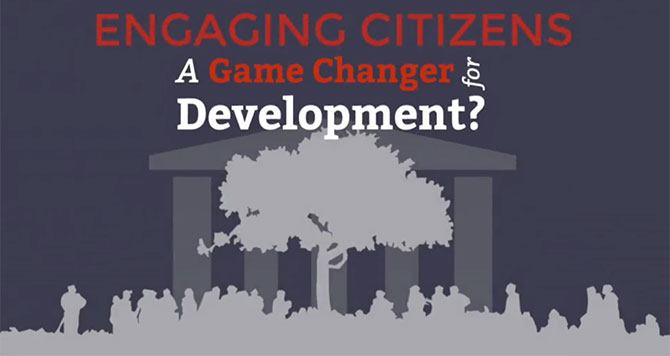[jwplayer mediaid=”1609″]
Download the video recording
Thursday 19 March 2015, 7.00-8.30pm
Venue: New Theatre, East Building
Speakers: As below:
- Jon-Paul Faguet, London School of Economics
- Yesil Deniz, London School of Economics
- Bjorn-Soren Gigler, World Bank
- Shirin Madon, London School of Economics
- Leni Wild, Overseas Development Institute
- Abha Joshi-Ghani, World Bank [Moderator]
- Vanessa Herringshaw, Transparency Initiative
- Duncan Edwards, Institute of Development Studies
- Fredrik Galtung, Integrity Action
- Duncan Green, Oxfam UK / London School of Economics
- Owen Barder, Center for Global Development / London School of Economics
About the Event
Engaging citizens has a vital role to play in the process of development. It helps to improve transparency and accountability of public policies, to build trust with citizens, to forge consensus around important reforms, and to build the political and public support necessary to sustain them.
A number of institutions, including the London School of Economics, have demonstrated their commitment to this important agenda by developing a MOOC – a free, four-week online course on citizen engagement.
The course examines the role that citizen engagement can play in improving policymaking and public service delivery, and investigates the impact of new technologies in this process. The course is hosted by Coursera and starts on 15 March.
The Department of International Development hosted a launch event on Thursday 19 March, in which a number of themes related to the MOOC were discussed with a panel of experts.
A higher-quality podcast is available to listen to or to download here.
About the Project: Engaging Citizens
The MOOC provides a holistic overview of citizen engagement through interactive videos, resources, and activities. It explores underlying theories and concepts of citizen engagement; examines the role it can play in improving policymaking and public service delivery; and investigates the impact of new technologies that empower governments and citizens to work together more effectively, particularly in developing countries.
The course is taught by a faculty of global experts and practitioners, including:
- John Gaventa (Institute for Development Studies),
- Rakesh Rajani (Ford Foundation),
- Danny Sriskandarajah (CIVICUS),
- Jonathan Fox (American University),
- and Beth Noveck (GovLab).
Through this course, we want to share and learn from the rich experiences of our development partners and course participants, and to contribute to the development of a global community of practice around citizen engagement.
Although the World Bank has been offering free e-learning courses for years, this is only the third MOOC that has been developed on Coursera – the world’s largest compatible platform with over 10 million users. The first two courses, on climate change and risk management, enabled us to reach an unprecedented number of people worldwide.
This new MOOC on citizen engagement is similar in international scope and will allow us to share cutting-edge research and insights with leaders, practitioners, and interested citizens around the world.
The course encourages collaboration and the sharing of ideas through open online discussions, dedicated social media channels, and Google Hangouts. Participants will share case studies from their own contexts with the broader group, allowing participants to learn not only from our presenters and facilitators but also from each other.
Students will also engage with existing communities of practice in this field, namely the Global Partnership for Social Accountability, Making All Voices Count, Participedia, and the Open Government Partnership, further utilizing the power of many to solve complex governance and development challenges.
The World Bank Group recently launched its new Strategic Framework for Mainstreaming Citizen Engagement in World Bank Group Operations. This framework builds on the WBG’s commitment to align all public and private sector interventions to our twin goals of ending extreme poverty and boosting shared prosperity, and to make citizen engagement a critical feature of our business model.
Citizen engagement and MOOCs underscore the critical value of a public good, and recognize that the wisdom of the many is greater than the knowledge of the few.
This MOOC reflects our commitment to citizen engagement for development, and we hope that by leveraging the inclusive, participatory, and collaborative nature of the MOOC format we will be able to help build a truly global community dedicated to citizen-centric governance.
Please join the conversation and register for the course: bit.ly/citizensengage
https://storify.com/LSE_ID/engaging-citizens-mooc-discussion






